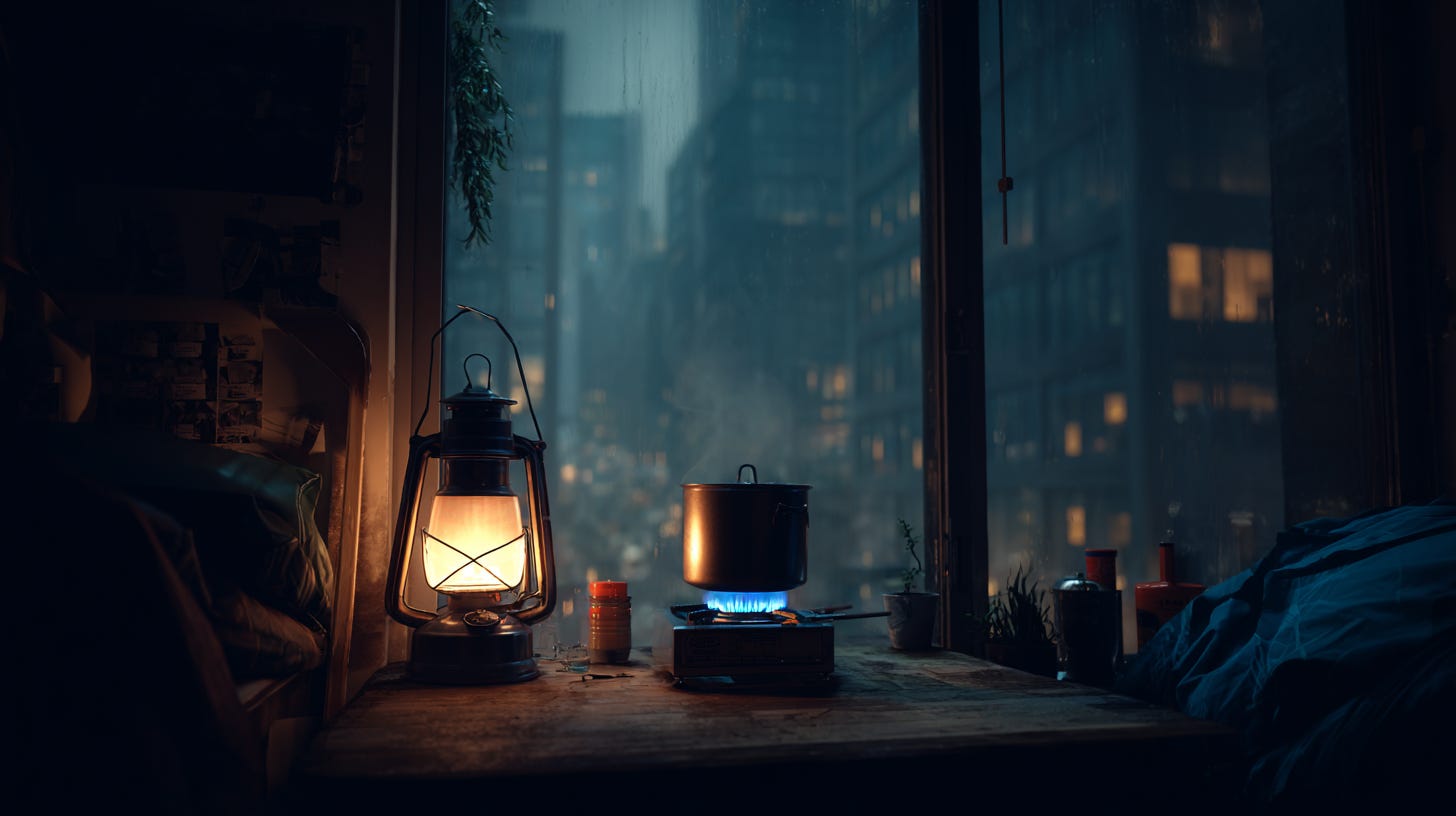Food: Beyond the Empty Shelves
When supply chains crack, food is more than fuel — it’s security, community, and survival.
We’ve seen what happens when shelves go bare.
In 2020, panic buying stripped grocery stores overnight.
Imagine that same scenario stretched not over days, but weeks — or longer.
In an urban collapse, food security is one of the hardest challenges you’ll face.
But with the right mix of storage, planning, and skills, you can keep your family nourished and resilient when systems fail.
Lessons From History
During the Balkan war, Selco wrote about neighbors betraying each other over a single can of food.
Hunger turns people desperate fast. And hungry kids make parents even more desperate.
In every conflict, from ancient blockades to modern crises, food has been used as leverage.
It’s not just calories — it’s power.
If you can feed your family without relying on fragile supply chains, you’re already miles ahead.
The Foundation: Stored Food
When it comes to urban preparedness, stored food is your backbone. But not all storage is equal.
Shelf-stable basics: rice, beans, oats, pasta — cheap, calorie-dense, and easy to store.
Canned goods: reliable, calorie-dense, and ready-to-eat with no cooking required. Beans, soups, vegetables, and canned meats (like tuna, chicken, or Spam) can stretch meals and provide protein. Heavy to store in bulk, but essential for variety and backup when fuel is limited.
Freeze-dried emergency food: lightweight, long-lasting, and easy to cook. (Just remember, it requires extra water — see my Water post for details.)
MREs (Meals Ready to Eat): military-grade, no cooking required, but heavier and not ideal as a sole source.
👉 Recommended emergency options:
ReadyWise Emergency Food — 25-year shelf life, variety of kits.
MREs from Ammo Can Man — reliable for short-term emergencies.
Cooking in a Blackout
Stored food only works if you can cook it. That’s where the Fire post comes in.
Freeze-dried food: needs boiling water.
Dry goods (rice, beans, pasta): need sustained heat.
MREs: often come with flameless ration heaters, or can be eaten cold if necessary.
A small camping stove, alcohol burner, or rocket stove can make the difference between raw calories and morale-boosting meals.
The Hidden Danger: Cooking Smells
In a densely packed environment — especially apartments — smells travel.
Through hallways, vents, and even thin walls, the scent of food can spread farther than you realize.
When people are hungry, a whiff of cooking rice or soup can be enough to bring them to your door.
In desperate times, that makes you a target.
Here’s how to minimize the risk:
Cook indoors, not outside. Outdoor cooking broadcasts smells across the whole block.
Keep meals simple. Stews, soups, or foods with strong aromas will carry farther. Stick to basics if tension is high.
Time your cooking. If possible, cook when there’s already background noise and activity, rather than in the silence of night.
Vent carefully. Don’t vent directly into shared hallways or open windows. Small fans and charcoal filters can help reduce odor.
Rotate cold options. MREs and ready-to-eat foods that don’t require cooking can cut down on how often you risk broadcasting scent.
Preparedness isn’t just about having food. It’s about keeping it safe from others who don’t.
Grow What You Can
Even in cities, food doesn’t just have to come from a can. Windowsills, balconies, and backyards can grow surprisingly much.
Herbs and leafy greens indoors.
Container gardening on balconies.
Community gardens as force multipliers.
Seed vaults to prepare for longer-term resilience.
👉 Recommended option:
Garden Heirloom Seed Vault — 100 varieties, long-term storage.
Practical Tips for Pathfinders
Diversify storage. Don’t rely on one type of food. Mix shelf-stable basics, freeze-dried, and MREs.
Rotate stock. Eat what you store, store what you eat. Prevents waste.
Track calories. You need fuel, not just “food.” Aim for at least 2,000 calories per adult per day.
Plan meals. Morale matters. Simple recipes make hard times easier.
Practice cooking with your gear. Don’t wait until the lights go out.
Skills, Not Just Stuff
Anyone can buy a bucket of emergency food.
Real resilience is knowing how to stretch meals, cook with limited fuel, and grow fresh food when supplies run low.
Skills outlast any stockpile.
Coming Next
In the next post, we’ll cover Shelter — how to hold space when the lights go out.
Subscribe and Stay Ready
This series is part of Urban Preparedness in Uncertain Times. Each post builds on the last to help you create a clear, practical plan for your family’s survival.
👉 Subscribe to Pathfinder Chronicles today and don’t miss the next post: Signaling and Communications.



